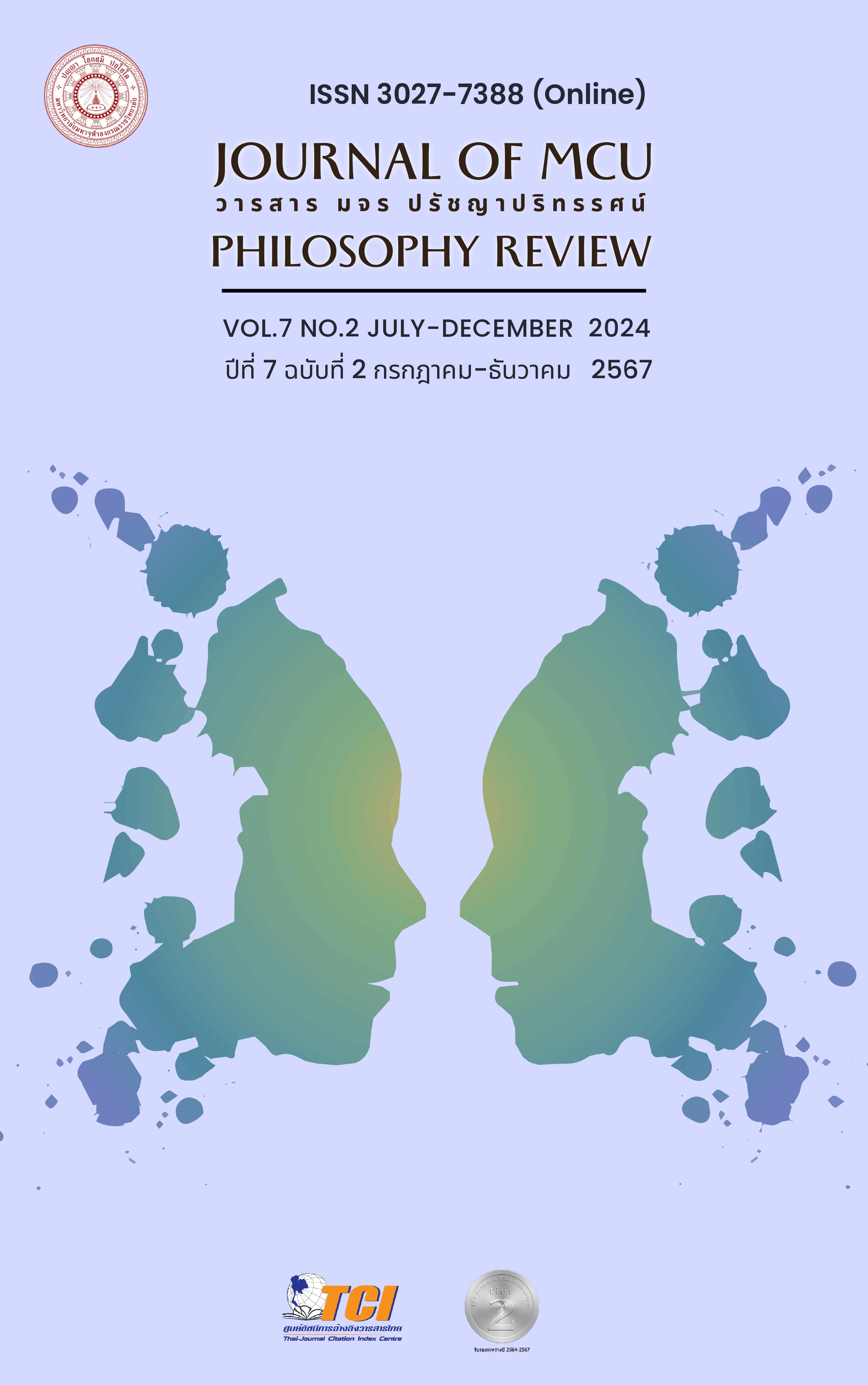A Concept of Distributive Justice in the View of Theravada Buddhist Philosophy
Main Article Content
Abstract
This research article has three objectives: 1) to study the concept of distributive justice of liberalism and socialism, 2) to study the concept of distributive justice in the view of Theravada Buddhist philosophy, and 3) to critically analyze the concept of distributive justice in the view of Theravada Buddhist philosophy. This research employed the qualitative research methodology done by critically studying documents, texts and related research works. From the study of the objective, it considerably showed that most of the idea on the just distribution of resources endorsed by Theravada Buddhist philosophy share the sameness with liberalism more than socialism. However, there are some ideas held by Theravada Buddhist philosophy vary from both, liberalism and socialism, to wit, Theravada Buddhist philosophy lays great emphasis on the freedom the state grants to the citizen in working for living life in accordance with their ability and righteous ways of doing which are somehow accorded with liberalism but becoming the weak point to socialism. In the same way, Theravada Buddhist philosophy significantly focusses on that thing where the basic requisites of citizen will be guaranteed while facing with poorness till meeting self-reliance and this is similar to what is supported by socialism but becoming the weak point to liberalism. Therefore, according to Theravada Buddhist philosophical viewpoint, the idea on the just distribution of resources should become the alternative way considered as the better than socialist and liberalist ideas due to providing the fairness to all concerned where sustainable development could be actualized accordingly.
Article Details

This work is licensed under a Creative Commons Attribution-NonCommercial-NoDerivatives 4.0 International License.
บทความที่ได้รับการตีพิมพ์เป็นลิขสิทธิ์ของวารสาร มจร ปรัชญาปริทรรศน์
ข้อความในบทความที่ได้รับการตีพิมพ์ในวารสาร ถือเป็นความรับผิดชอบของผู้เขียนบทความ และข้อคิดเห็นนั้นไม่ถือว่าเป็นทัศนะและความรับผิดชอบของกองบรรณาธิการวารสาร มจร ปรัชญาปริทรรศน์
References
คาร์ล มาร์กซ, เฟรเดอริค เองเกลส์. (2510). แถลงการณ์พรรคคอมมิวนิสต์. กรุงเทพมหานคร: สำนักพิมพ์ไฟลามทุ่ง.
ซีมอน เฟาท์ และคณะ. (2558). เศรษฐศาสตร์กับสังคมประชาธิปไตย. กรุงเทพมหานคร: มูลนิธิฟรีดริค เอแบรท์.
บัตเลอร์, เอมอนน์. (2558) อดัม สมิธ: ชีวิตและความคิด. แปลโดย พิชิต ลิขิตกิจสมบูรณ์. กรุงเทพมหานคร: โอเพ่นเวิลด์ส พับลิชชิ่ง เฮาส์.
พระพรหมคุณาภรณ์ (ป.อ.ปยุตฺโต). (2555). พจนานุกรมพุทธศาสตร์ ฉบับประมวลธรรม. พิมพ์ครั้งที่ 23. กรุงเทพมหานคร: สำนักพิมพ์ผลิธัมม์.
มหาจุฬาลงกรณราชวิทยาลัย. (2539). พระไตรปิฎกภาษาไทย ฉบับมหาจุฬาลงกรณราชวิทยาลัย. กรุงเทพมหานคร : โรงพิมพ์มหาจุฬาลงกรณราชวิทยาลัย.
สมเด็จพระพุทธโฆษาจารย์ (ป.อ.ปยุตฺโต). (2561). การพัฒนาที่ยั่งยืน (Sustainable Development). พิมพ์ครั้งที่ 21. กรุงเทพมหานคร: สำนักพิมพ์ผลิธัมม์.
สมเด็จพระพุทธโฆษาจารย์ (ป.อ.ปยุตฺโต). (2564). พุทธธรรม ฉบับปรับขยาย. พิมพ์ครั้งที่ 56. กรุงเทพมหานคร: โรงพิมพ์ บริษัท สหธรรมิก จำกัด.
สมภาร พรมทา. (2539). ปรัชญาสังคมและการเมือง. พิมพ์ครั้งที่ 2. กรุงเทพมหานคร: สำนักพิมพ์จุฬาลงกรณ์มหาวิทยาลัย.
สมภาร พรมทา. (2547). กิน : มุมมองของพุทธศาสนา. กรุงเทพมหานคร: โครงการเผยแพร่ผลงานวิชาการ คณะอักษรศาสตร์ จุฬาลงกรณ์มหาวิทยาลัย.
สมภาร พรมทา. (2560). นิติปรัชญา ความเรียงว่าด้วยกฎหมาย ศีลธรรม และความยุติธรรม. กรุงเทพมหานคร:สำนักพิมพ์วารสารปัญญา.
สมฤดี วิศทเวทย์. (2526). ปรัชญาของจอห์น ล็อค. กรุงเทพมหานคร: ภาควิชาปรัชญา คณะอักษรศาสตร์ จุฬาลงกรณ์มหาวิทยาลัย.
อดัม สมิธ. (2560). The Wealth of Nations ความมั่นคงของประชาชาติ เล่มที่ 1 – 3. แปลโดย กฤตณัฐ ธรรมาภิบาลจิต. กรุงเทพมหานคร: แอคทีฟ พริ้นท์.
อภิชัย พันธเสน. (2558). พุทธเศรษฐศาสตร์ : วิวัฒนาการ ทฤษฎี และการประยุกต์กับเศรษฐศาสตร์สาขาต่างๆ. พิมพ์ครั้งที่ 4. กรุงเทพมหานคร: อมรินทร์ อมรินทร์พริ้นติ้งแอนด์พับลิชชิ่ง.
ปรีชา ช้างขวัญยืน. (2540). ทรรศนะทางการเมืองของพุทธปรัชญา. คณะอักษรศาสตร์ จุฬาลงกรณ์มหาวิทยาลัย: บริษัท สามัคคีสาส์น จำกัด.
พระมหามฆวินทร์ ปุริสุตฺตโม. (2566). แนวคิดเรื่องความเท่าเทียมในการแบ่งปันทรัพยากรในปรัชญาสังคมนิยมคาร์ล มาร์กซ์. วารสาร มจร ปรัชญาปริทรรศน์. 6 (2), 28.
Jeppe Von Platz. (2020) Theories of Distributive Justice: Who Gets What and Why. New York: Routledge.
Karl Marx. (1976). Capital. Volume One. Translated by Ben Fowkes. London: New Left Review.
Marx, Karl. (1970). Clitique of the Gotha Programme. In Selected work, Vol. 1. London: Oxford, 1970.
Michael Freeden. เสรีนิยม: ความรู้ฉบับพกพา = Liberalism: A Very Short Introduction. (2563). แปลโดย เกษียร เตชะพีระ. กรุงเทพมหานคร: บุ๊คสเคป.
Smith, Adam. (2003). THE WEALTH OF NATIONS. Edited by Bantam Classic. New York: Bantam Dell.
Somparn Promta. (2017). Wisdom and Politics: A Political Theory Based on the Integrated Thoughts of Karl Marx, Charles Darwin, and the Buddha. Bangkok: Wisdom Magazine Publishing House.
Somparn Promta. (2018). Proper Balancing: My Political Philosophy. Bangkok: Wisdom Magazine Publishing House.
Somparn Promta. (2020). Lectures in Social and Political Philosophy. Bangkok: Wisdom Magazine Publishing House.


